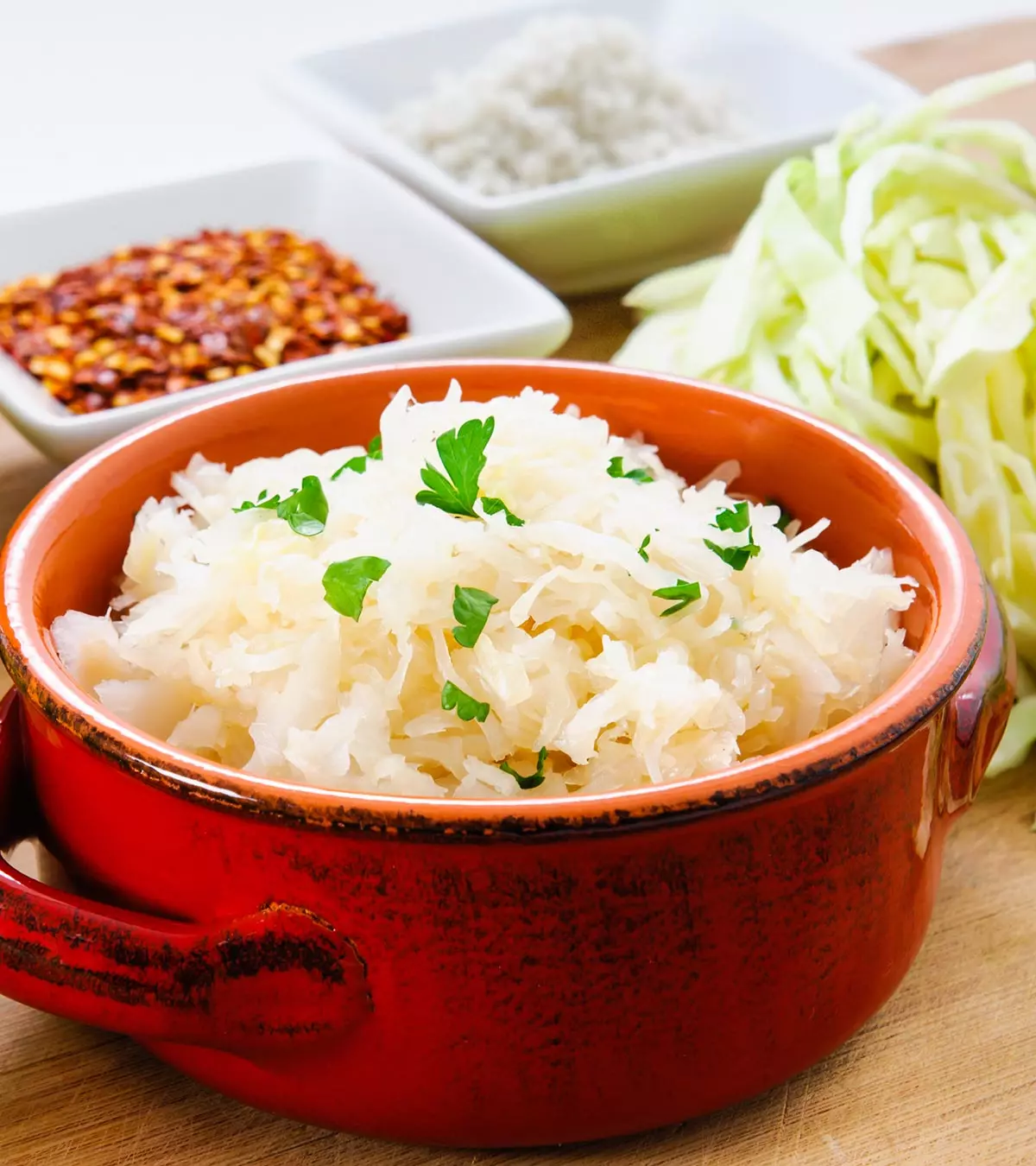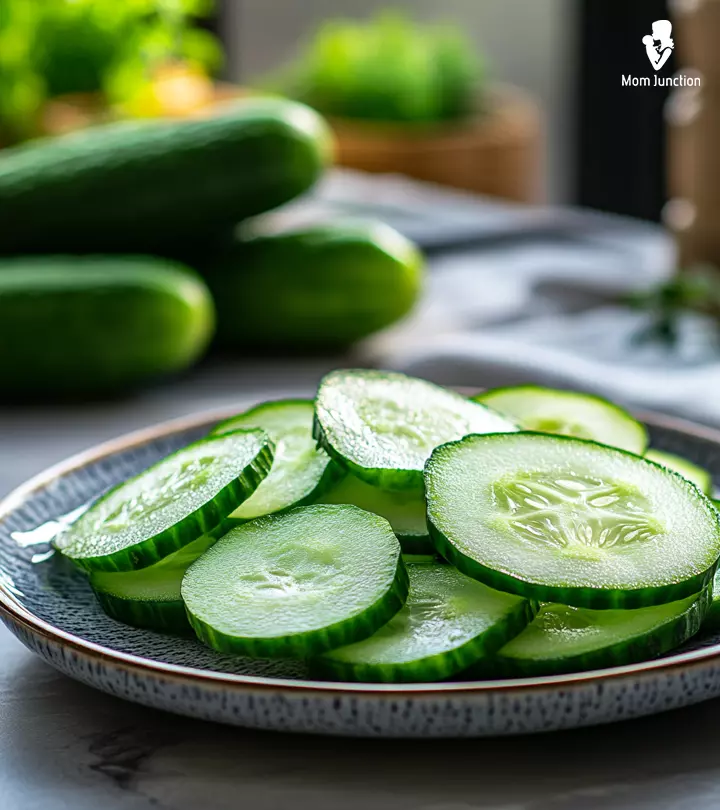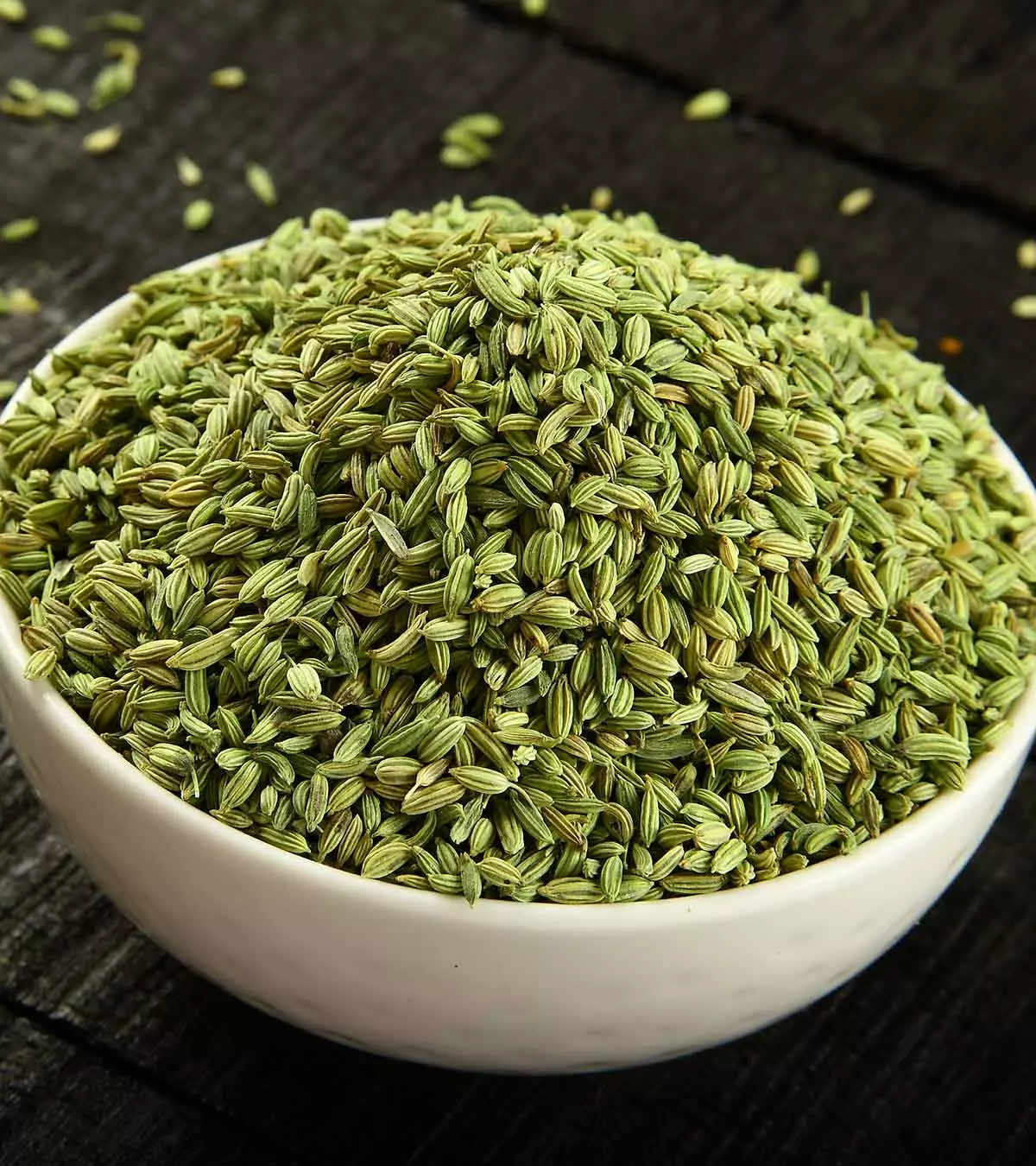
Image: iStock
When you are pregnant, you might be apprehensive about several dietary choices. One such choice is the consumption of coconut water in pregnancy. Coconut water is a sweet and nutrient-rich drink that can hydrate your body and provide vital nutrients.

People like consuming this clear, vegan, isotonic drink to re-energize and nourish themselves. But since coconut water has a high amount of sodium and potassium, knowing if it’s safe for consumption during pregnancy is essential.
Keep reading as we tell you about the safety of coconut water for pregnant women, its possible health benefits and side effects, and more.
Key Pointers
- Coconut water is safe to drink during pregnancy when consumed in moderation.
- Coconut water may act as a natural diuretic, ease heartburn and constipation, fight infections, promote heart health, and have other benefits when consumed during pregnancy.
- It is safe to take during pregnancy unless the woman is allergic.
- Coconut milk contains lauric acid, which has antiviral and antibacterial characteristics and is known to strengthen the immune system.
- It also includes iron, which aids in treating anemia, eases digestive issues, relaxes the body and mind, controls blood sugar and blood pressure, and eases joint discomfort.
Is It Safe To Consume Coconut Water During Pregnancy?

Yes, it is safe to drink tender coconut water during pregnancy. However, like any other food, moderation is the key to safety. Coconut water is rich in minerals, such as potassium, and its overconsumption could lead to too much potassium in the blood. This condition is known as Hyperkalemia (1).
Hyperkalemia could lead to changes in the heart rhythm, which can be fatal. During pregnancy, this electrolyte imbalance could lead to more serious complications.
Therefore, it is advisable to consult with a healthcare provider before incorporating coconut water into your diet, especially for women with pre-existing health conditions or those on medication.
 Be watchful
Be watchful12 Health Benefits of Coconut Water During Pregnancy
Coconut water is a rejuvenating, healthy, and safe drink that can be relished during pregnancy. It is a good source of electrolytes, fluids, and nutrients. It contributes to the health of the mother and the baby, promoting a safe pregnancy.
The nutritional benefits of coconut water can be well understood from its proximate composition. 100 grams of tender coconut water contains the following nutrients:
| Name | Amount | RDA (per day) |
|---|---|---|
| Water | 94.99g | – |
| Energy | 19 KCal | – |
| Sugars, total | 2.61g | – |
| Calcium | 24mg | 1000mg |
| Magnesium | 25mg | 350mg |
| Phosphorus | 20mg | 700mg |
| Potassium | 250mg | 2900mg (AI) |
| Sodium | 105mg | 1500mg |
1. Potential natural diuretic:
Coconut water is considered as a natural diuretic. It increases the urge to urinate because of the presence of potassium, magnesium, and other minerals. They aid in flushing away the toxins and clearing the urinary tract. This possible antilithogenic properties of coconut water could, thus, prevent kidney stones and infections (4). It may also play a crucial role in the prevention of urinary tract infections, therefore lowering the chances of preterm labor.
While the use of coconut water during pregnancy is good, the quantity you consume must be kept in control.
2. Contains essential electrolytes:
The need for electrolytes increases during pregnancy because conditions like morning sickness, nausea, vomiting, and diarrhea dehydrate the body. Coconut water supplies all the five essential electrolytes: minerals, sodium, calcium, potassium, and phosphorus, which can soothe the body and provide energy (5).
These electrolytes also aid in the transmission of electrical charges in your body and support muscle functioning. They also maintain maintain your body’s pH levels and control blood pressure levels (6).
3. Provides relief from heartburn and constipation:

Hormonal changes during pregnancy could lead to several issues such as heartburn, constipation, and indigestion. A considerable dietary fiber content in coconut water could help strengthen digestive health, regulate pH levels, maintain fluid balance, and prevent constipation.
Ayurveda considers tender coconut water to be a potential laxative (4). It is considered to improve metabolism and support the detoxification of your body. Coconut water is a natural acid neutralizer and, therefore, can prevent heartburn.
4. Combat infections:
Coconut water has considerable amounts of antioxidants, vitamins, and minerals which boost your immunity, providing resistance from infections. It also contains lauric acid, a medium-chain fatty acid responsible for the production of a powerful antimicrobial compound monolaurin (7).
5. Supports maintain heart health:
Low electrolytes levels spike the blood pressure. Drinking coconut water can help improve the levels of potassium, magnesium, and lauric acid, which could help in regulating blood pressure (8). It also improves good cholesterol and combats bad cholesterol, a phenomenon crucial for maintaining heart health (9).
A glass of coconut water every day is believed to be useful in the final trimester when there is brewing tension of labor and delivery that can increase your blood pressure.
6. Aids in maintaining a healthy weight:
Coconut water is low-fat and low in calories (9). So, it may be a good alternative to sugary drinks as it may help maintain weight during pregnancy. As pregnancy adds extra weight to your body, coconut water could help prevent it from getting any worse by controlling the total calorie consumption and controlling hunger pangs.
 Research finds
Research findsKristin Gillespie, MS, RD, LDN, a registered dietitian and certified nutrition support clinician from Virginia, says, “Coconut water contains several nutrients that are key to supporting healthy pregnancy and fetal development. It is rich in vitamin C, calcium, potassium, and magnesium, and also offers small amounts of some other minerals. It can be an excellent alternative to juice, containing far less sugar and calories.”
7. Natural drink:
Coconut water is a tasty, natural, and gluten-free drink without artificial flavors or harmful components. These features make coconut water a perfect replacement for cold drinks or sodas during pregnancy. Dehydration during pregnancy is not uncommon. Fresh and tender coconut water or buko water for pregnant women can help quench thirst and refresh them without adding harmful substances to the body.
8. Rehydrate after workout:

Coconut water is a natural isotonic drink, which helps in treating dehydration and supplying energy when you are fatigued, and exhausted. If you exercise regularly, you can opt for coconut water as a low-calorie energy drink (10). Hydration is considered to improve the elasticity of the skin, therefore limiting the stretch marks that develop during pregnancy (11).
9. Low sugar content:
Lethargy is common during pregnancy. Therefore, you may look for energy drinks. This does not seem to be bothersome at that moment. However, excessive intake of sugar can lead to an increase in overall blood sugar levels. One hundred grams of coconut water has 2.1 grams of sugar, which is less than other energy drinks. This low-sugar drink will not add to any pregnancy weight. A diet low in simple sugars will lower the risk of getting gestational diabetes.
10. Might help fetal growth:
Some researchers have found that tender coconut water contains certain biologically active compounds and growth-promoting factors (12). In addition, coconut water also offers all the essential nutrients to the mother that are believed to help in the growth and development of the fetus.
An anonymous mother who blogs under the name ‘Mummy in Bangkok’ says, “When I was in Singapore, I had already heard about the many benefits of drinking coconut water during pregnancy. There are beliefs that coconut water will help you have a smooth, natural delivery and make the baby come out ‘clean.’ I can’t attest that the part on smooth, natural delivery and a ‘clean’ baby is true, as I had a C-section in the end. But I’m grateful that Noah (her baby boy) didn’t have the common newborn skin problems such as cradle cap, eczema, and acne. Guess it’s all thanks to the wonderful coconut water (i).”
11. Improves amniotic fluid levels:
Coconut water, taken especially in the third-trimester, boosts the amniotic fluid levels and enhances blood volume and circulation (13).
12. Overall protection:
A research study showed that coconut water during pregnancy provides protection against maternal high-fat diet-induced changes (14). This is crucial as it has been demonstrated in various researches that maternal diet impacts the growth and development of the fetus. However, more research is required to validate the claim.
 Research finds
Research findsAre There Any Side Effects Of Coconut Water During Pregnancy?
There is no evidence that proves coconut water has adverse effects on pregnancy. Like any other fruit or vegetable juice, it also seems to be safe. However, safety during pregnancy is vital for the mother and the unborn baby. Therefore, it is wise to be cautious. Overconsumption of ripe coconut water may cause constipation.
How Much Coconut Water Can A Pregnant Woman Have?
- Moderation is always the key when it comes to taking a healthy diet. You can drink up to one to two glass of coconut water a day. Trista Best, MPH, RD, LD suggests, “In pregnancy, it can often be confusing to know what, when, and how much of something you can consume, and this is often on a stomach that tolerates. Coconut water, like any fruit water, should be consumed in moderation, especially by those who need to limit sugar.”
- Prefer to consume fresh coconut water from young coconuts over packaged coconut water. Use a clean straw or pour it into a glass and drink.
- Do not consume coconut water if you react to it or dislike its taste.
How To Select The Right Coconut?
To enjoy the various benefits of coconut water, you should know how to select them properly. These tips may help you to buy fresh and tender coconut.
A fresh coconut will be light and sweet and will not contain coconut meat, the white, fleshy, tender substance. A ripe or stale one will taste sour.
Selection: Pick medium-sized, clean, and green-colored coconuts as they contain large amounts of water. Do not choose coconuts that have hard brown shells and gray patches as they indicate mature nuts.
Water: Shake the coconut vigorously near your ear to check if it has water. Select the ones which produce good sloshing sound. A fresh coconut will contain nearly a cup of water.
If you want to store coconuts at home, keep them in a cool area.
Myths About Coconut Water During Pregnancy:
You may also come across some myths, and it is very important for you to get those facts clear. Here they are:
Myth 1 – Coconut Water Has Magical Properties
Coconut water contains many nutrients and provides natural hydration, which is the reason it is suggested for pregnant women.
Fact: Pregnant women need all essential nutrients and minerals in proper amounts. It is an age-old myth that coconut water alone can help meet all requirements necessary for optimum pregnancy nutrition.
Pregnancy is a time when quality nutrition is highly crucial. In such a scenario, moderation and variety should be the focus. A well-planned, balanced diet is what you need. To this balanced diet, coconut water can be added.
Myth 2 – Coconut Water Improves Baby Hair
Your baby will be born with thick hair on the scalp when you drink coconut water during pregnancy.
Fact: There are no research studies that could link the consumption of coconut water to the quality of the baby’s hair.
Myth 3 – Coconut Water Makes Your Baby’s Skin Fair And Healthy
Drinking coconut water while you are pregnant will give a clear and fair complexion to your baby.
Fact: Mere consumption of coconut water will not make your baby’s skin fair and clear. Your baby’s skin and health will depend on many factors, including genetics, nutrition, parents’ health, and more.
Eating Coconut During Pregnancy:
Consumption of coconut meat is also considered beneficial during pregnancy.
Benefits Of Coconut Meat During Pregnancy
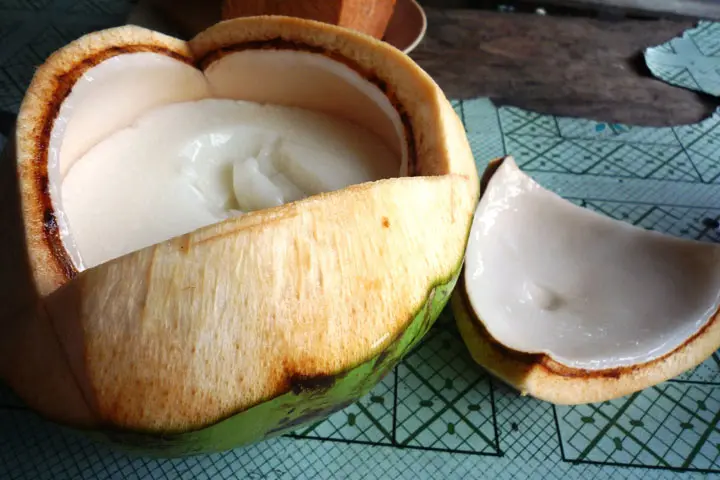
Coconut kernel or meat is the flesh of the tender green coconut, which is nutritious. Coconut flesh from tender green coconuts is sweet. However, the total sugar content of the same is less compared to many other fruits. Also, it is rich in protein and minerals such as folate, iron, zinc, and phosphorus (15). This nutrition profile makes it a wise choice to eat coconut meat during pregnancy.
1. Breast milk:
It is believed that regular consumption of coconut meat during pregnancy enhances the supply of breast milk after delivery. However, there are no clinical studies that could associate the consumption of coconut meat and the enhancement of breastmilk supply.
Although, considerable scientific studies show that the oral and topical application of virgin coconut oil by breastfeeding mothers leads to enhanced breast milk production.
Coconut oil is rich in lauric and capric acid. These are two medium-chain triglycerides, the consumption of which during the lactation phase is beneficial. These fatty acids are known to possess antiviral, antibacterial, and parasiticidal effects, which could aid in the development of the immune system.
2. Improves blood circulation:
The blood volume doubles during pregnancy, causing swollen feet and legs. Poor circulation of blood aggravates the condition. It is believed that consuming coconut meat can possibly improve your blood circulation and prevents swelling and pain in the legs. However, there are no clinical studies to prove this.
However, a randomized crossover trial showed that oral consumption of virgin coconut oil can increase the concentration of high-density lipoprotein cholesterol. This property is considered to be potentially beneficial for cardiovascular health (16).
3. Aids digestion:
Coconut meat is nutritious and rich in fiber (9). It is due to its rich fiber content that it is considered effective in managing constipation, a common concern during pregnancy.
4. Better sleep:
Sleep during the third trimester is something that many pregnant women struggle with. This is partly due to hormones and partly due to increasing weight that makes it difficult for women to sleep in a specific position for long.
Both these causes lead to sleep disturbances, which then lead to fatigue and disrupt the overall well-being of the expecting woman (17). In alternative medicine, it is believed that having coconut meat in combination with poppy seeds and ghee may aid in the regulation of your sleep cycle.
5. Boosts metabolism:
It is believed that oral consumption of coconut meat mixed with spices could be helpful in boosting metabolic activities in pregnant women. However, there are no specific studies to prove the validity of the belief.
Coconut Milk During Pregnancy
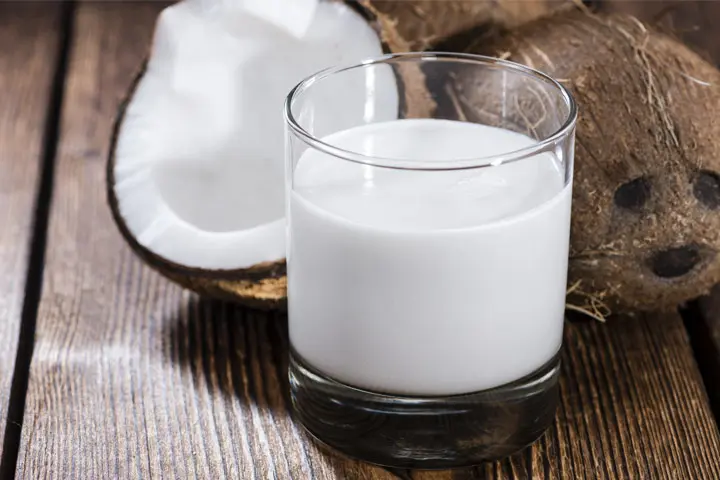
Coconut milk is a thick and milky liquid obtained by crushing grated coconut flesh. It is also an essential ingredient in many foods, especially in Southeast Asian dishes. Coconut milk helps boost body fuel. It is completely safe to drink unless you are allergic to it. So, consult your doctor before you plan to add the same to your diet.
Benefits Of Coconut Milk During Pregnancy
1. Possibly improves immunity:
Coconut milk contains lauric acid, a medium-chain fatty acid that makes up most of the MCTs in coconut oil. It is believed to have antibacterial and antiviral properties (18) that might be helpful for pregnant women. This type of fat is considered to help improve the immune system, according to the book ‘Coconut Oil and Immune System’ by Sherri Neal. The long-chain fatty acids are considered to straighten the blood vessels and reduce any blockages in the heart, thereby improving the heart condition as well.
2. Other benefits:
- It contains good amounts of iron, which can aid in treating anemia.
- It can aid in improving digestive issues
- It could offer relaxation to the muscles and nervous system
- Could help manage blood sugar and blood pressure levels
- Provides symptomatic relief from joint pains and scratching pains
- Could make your body fit and helps lose weight
How To Prepare Fresh Coconut Milk?
It is advisable to make coconut milk at home, fresh rather than opt for a packaged one.
- Grate one whole coconut and add one and a half cups of hot water.
- Leave the mixture to cool at room temperature.
- Once the mixture is cooled, strain it to obtain the milk.
One cup of coconut milk (approximately 240gm) has the following nutritional values:
- Calories – 550
- Fats – 50.2gm (all types of fats)
- Sodium – 40gm
- Carbohydrates – 14gm (in 250gm milk)
- Proteins – 6gm
- Vitamin C – 11%
- Iron – 22%
- Calcium – 4%
Is Canned Coconut Milk Good During Pregnancy?
Canned coconut milk is safe to have during pregnancy, but you need to make sure that the can is not corroded, rusted, expired, or stored at unsafe temperatures.
Coconut milk contains considerable amounts of saturated fats, i.e., 3gm in one tablespoon. Taking in too much-saturated fat could increase both good and bad cholesterol levels in the body. In the case of canned milk, you should be aware of your consumption level as it should not exceed your daily requirement.
Besides the above, other reasons why you cannot choose canned coconut milk are:
1. Bisphenol – A (BPA):
It is a chemical usually used in the lining of cans used for packaged foods. This BPA may gradually leach into acidic, fatty, or salty foods like coconut milk, vegetables, tomatoes, and soups. A study states that there is a relation between high BPA levels in mothers and neurobehavioral problemsiA group of disorders related to disease and injuries of the brain, including dementia, stroke, and neuro-oncological conditions in infants (19).
2. Guar Gum:
Guar gum is an additive present in canned coconut milk. It is a galactomannan, a polysaccharide, and is mainly a ground endosperm of guar beans. There have been complaints like severe abdominal cramping, indigestion, flatulence, and diarrhea, as beans are difficult to digest. In a clinical experiment, patients who had gut issues showed improvement when they stopped using canned coconut milk in their diet.
3. Fructose malabsorption:
It is a digestive disorder characterized by an impairment of fructose (a simple sugar found in fruits, vegetables, and honey) transport across the small intestine. The increased fructose levels in the gut cause bacterial overgrowth. It, therefore, reduces the absorption of water into the intestine. Pregnant women with inflammatory bowel diseaseiA condition that leads to intestinal swelling and chronic pain (IBD) and irritable bowel syndromeiA disorder that affects the digestive tract, leading to uncontrollable gas, diarrhea, and issues with bowel movement contraction (IBS) are highly affected by fructose malabsorption (20).
According to a brief on Fructose Restricted Diet, St. Luke’s Hospital recommends limiting the use of coconut milk and cream. Coconut milk contains sugar, including fructose (21). Therefore, it should also be avoided by those affected by IBD and IBS disorders.
Frequently Asked Questions
1. Is buko juice safe for pregnant women?
Buko juice or coconut juice is a mixture of coconut water, tender coconut meat, and milk. It is a very refreshing and healthy drink, popular in the Philippines. All you need to do is extract the coconut water, scrape the meat, and put them both in a pitcher. Add milk, sugar, and lots of ice cubes. Allow the mixture to melt and then serve. Since the drink is a combination of coconut water, meat, and milk, it can be safely consumed by pregnant women.
2. Does coconut water need pasteurization?
Unlike other fruit juices that are better when pasteurized, tender coconut water is traditionally consumed fresh. However, if you are consuming a packaged or canned coconut water, pasteurization is mandatory to ensure microbiological safety.
3. Does coconut water help with labor?
Gillespie opines, “While some women have reported this, there’s no research to support a link between coconut water and induction or ease of labor.”
4. What is the best time to drink coconut water during pregnancy?
Coconut water is a refreshing drink that can be consumed anytime during the day. While some experts advise drinking coconut water in the morning or as a mid-day refreshment, others recommend taking it soon after a workout to replenish lost water and electrolytes. Irrespective of when you consume it, ensure the coconut water is fresh and hygienic.
5. Is drinking coconut water during early pregnancy safe?
Yes. Moderate intake of coconut water throughout pregnancy is safe. Coconut water is a hydrating beverage containing several essential nutrients that can be beneficial for you or your baby.
A tender coconut is a great option during pregnancy, so you can continue drinking coconut water during pregnancy. All coconut products, including meat, milk, and water, are healthy for the mother and the developing fetus. Coconut water, in particular, is high in nutritional components and has rejuvenating properties. However, it is critical to ensure the quality of coconuts, and even the quantity must be carefully monitored, as excessive consumption can be harmful to both the mother and the growing baby. Therefore, be cautious when consuming them.
Infographic: What Are The Benefits Of Coconut Milk During Pregnancy?
Coconut milk is a versatile ingredient that can be safely consumed while pregnant and is utilized in various desserts and other recipes. Check out the infographic below to discover some of coconut milk’s advantages for expectant mothers.
Some thing wrong with infographic shortcode. please verify shortcode syntax
Illustration: Benefits Of Drinking Coconut Water During Pregnancy

Image: Stable Diffusion/MomJunction Design Team
Personal Experience: Source
MomJunction articles include first-hand experiences to provide you with better insights through real-life narratives. Here are the sources of personal accounts referenced in this article.
i. Coconut water: a pregnancy must-have;https://mummyinbangkok.wordpress.com/
References
1.Potassium; The Nutrition Source; Harvard T.H. Chan School Of Public Health
2. Nuts, coconut water (liquid from coconuts); USFDA
3. Micronutrient Needs During Pregnancy and Lactation; Oregon State University
4. Roshan M. Patel et al.; Coconut Water: An Unexpected Source of Urinary Citrate; Hindawi
5. Jean W. H. Yong et al.; The chemical composition and biological properties of coconut (Cocos nucifera L.) water; MDPI
6. Electrolytes — What Are They? What Happens If You Don’t Have Enough?; Rosewell Park
7. Kristi L. Strandberg et al.; Glycerol Monolaurate Inhibits Candida and Gardnerella vaginalis In Vitro and In Vivo but Not Lactobacillus; National Center For Biotechnology Information
8. Is The Coconut Water Craze All It’s Cracked Up To Be?; NPR
9. Coconut Oil; Health Benefits; Coconut Development Board
10. Svetlana Madjunkova et al.; The Leading Concerns of American Women with Nausea and Vomiting of Pregnancy Calling Motherisk NVP Helpline; National Center For Biotechnology Information
11. What Can Be Done To Prevent Stretch Marks?; American Pregnancy Association
12. Coconut Water -Properties, Uses, Nutritional Benefits in Health and Wealth and in Health and Disease: A Review; Academia
13. The Coconut Bible; UCLA
14. Kunle-Alabi OT et al.; Coconut water alters maternal high fat diet induced changes in hormones and pup morphometry of Wistar rats.; National Center For Biotechnology Information
15. P.S.A. Silva* and A. Bamunuarachchi; Manufacture of carbonated tender coconut water and development of a process for the utilization of coconut flesh; Semantic Scholar
16. Surarong Chinwong et al.; Daily Consumption of Virgin Coconut Oil Increases High-Density Lipoprotein Cholesterol Levels in Healthy Volunteers: A Randomized Crossover Trial; National Center For Biotechnology Information
17. Pregnancy and Sleep; National Sleep Foundation
18. Lauric Acid; PubChem; National Center For Biotechnology Information
19. Sheela Sathyanarayana et al.; Case Report: High Prenatal Bisphenol A Exposure and Infant Neonatal Neurobehavior; National Center For Biotechnology Information
20. Fructose-Restricted Diet; UW Health
21. Fructose Restricted Diet; St. Luke’s Hospital
22. The Health Benefits of Coconut Water; Cleveland Clinic
23. O T Kunle-Alabi, et al.; Coconut water alters maternal high fat diet induced changes in hormones and pup morphometry of Wistar rats; National Library of Medicine
24. Ratih Kusuma Wardhani, et al.; The Effect of Coconut Water Consumption On Labor Advancement in The Phase I Activities in The Mother; STRADA Jurnal Ilmiah Kesehatan
Community Experiences
Join the conversation and become a part of our nurturing community! Share your stories, experiences, and insights to connect with fellow parents.
Read full bio of Jyoti Benjamin
- Kristin is a registered dietitian and certified nutrition support clinician (from West Virginia University) based in Virginia Beach, VA, with ten years of experience. She is practicing as a nutrition manager for Option Care Health, Illinois, after earning a Master’s degree in human nutrition from Eastern Michigan university.
 Kristin is a registered dietitian and certified nutrition support clinician (from West Virginia University) based in Virginia Beach, VA, with ten years of experience. She is practicing as a nutrition manager for Option Care Health, Illinois, after earning a Master’s degree in human nutrition from Eastern Michigan university.
Kristin is a registered dietitian and certified nutrition support clinician (from West Virginia University) based in Virginia Beach, VA, with ten years of experience. She is practicing as a nutrition manager for Option Care Health, Illinois, after earning a Master’s degree in human nutrition from Eastern Michigan university. - Trista Best is a registered dietitian at Balance One Supplements, Environmental Health Specialist, and Adjunct Nutrition Professor. She completed her Masters of Public Health Nutrition from Liberty University and BS Dietetics from the University of Alabama before getting Dietitian Registration in 2018.
 Trista Best is a registered dietitian at Balance One Supplements, Environmental Health Specialist, and Adjunct Nutrition Professor. She completed her Masters of Public Health Nutrition from Liberty University and BS Dietetics from the University of Alabama before getting Dietitian Registration in 2018.
Trista Best is a registered dietitian at Balance One Supplements, Environmental Health Specialist, and Adjunct Nutrition Professor. She completed her Masters of Public Health Nutrition from Liberty University and BS Dietetics from the University of Alabama before getting Dietitian Registration in 2018.
Read full bio of Swati Patwal
Read full bio of Rebecca Malachi
Read full bio of Reshmi Das









